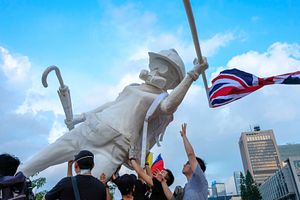“Fight for freedom! Stand with Hong Kong! Five demands! Not one less!”
These are some of the mottoes shouted from the pro-democracy protesters day and night on the streets of Hong Kong. Until March, these streets were usually calm and peaceful. Now in its 15th week of protests, Hong Kong continues to convulse and cry out, wracked with turmoil sparked by the failure of the Carrie Lam government to listen to all of the demands of her people.
The impetus for the protests relates back to a extradition bill proposed in February between Taiwan, Hong Kong and mainland China. The proposed bill came to the forefront due to a homicide case that happened last year involving a Hong Kong couple that traveled to Taiwan. The man killed his girlfriend while they were traveling. The Taiwanese government wanted to extradite the man from Hong Kong to stand trial for the murder, but Hong Kong had no extradition agreement with Taiwan, so the parents of the murdered girl went to a pro-Beijing party called the DAB (Democratic Alliance for the Betterment and Progress of Hong Kong) for help. The DAB, in turn, asked Carrie Lam to help get justice for the girl’s family. Thus, Lam proposed the extradition bill.
Ever since the 1997 handover, Hong Kong has been negotiating with mainland China to come up with an agreement to send criminal suspects back and forth between them; a deal has never eventuated in large part because of the two different legal systems that exist on the mainland in Hong Kong. Lam thought that she could succeed in addressing an issue that previous chief executives have failed to do over the past 22 years. Importantly, she had the support of her advisers, supporters in the Legislative Council, the DAB, and Beijing.
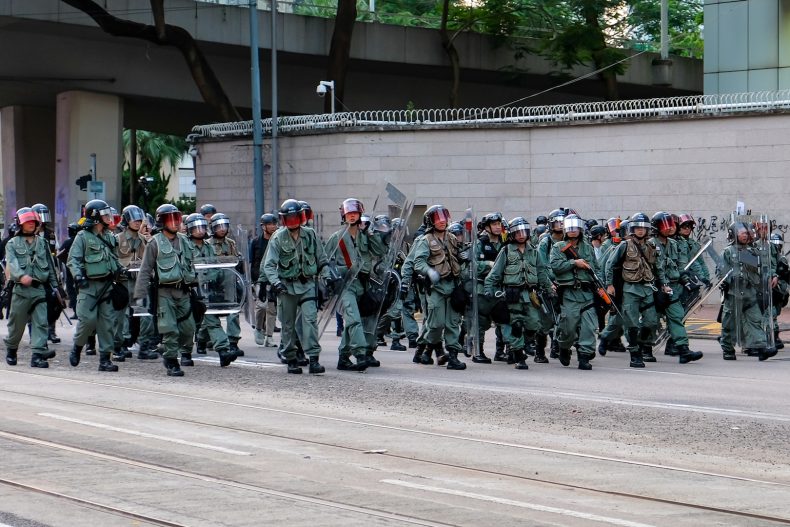
Riot police marching towards the protesters after a standoff. Photo by Thomas Brath.
Since coming to power in 2017, Lam has handled other controversial decisions. One of these was called the “co-location agreement” — the setting up of a joint checkpoint for the high-speed rail link to Guangzhou on the mainland, right in the heart of Hong Kong. The agreement meant that mainland laws could be implemented on Hong Kong territory, despite the fact that such an arrangement would appear to go against the one country, two systems tenet that stands at the core of Hong Kong-mainland interactions. The business people of Hong Kong immediately started to worry that they could be targeted and sent back to the mainland.
But the extradition bill pushed Hong Kongers over the edge.
The backlash against Lam was a sea of humanity marching in the streets for, so far, 15 consecutive weeks, chanting and clashing with police. Eventually, this forced Lam in early September to formally withdraw the bill. An earlier attempt to merely shelve it temporarily was not satisfactory. As a result, she not only lost the confidence of the Hong Kong people but also Beijing. A few weeks ago, a recording was leaked to Reuters from a speech Lam made to a group called Vision 2047. In it she said that the current demands of the protesters are out of her hands now because it has escalated to a national security level. Now, she said, it is up to Beijing to decide what to do. Even if Lam had wanted to meet the demands of the protesters it is apparent that she cannot because Beijing has instructed her not to concede to them.
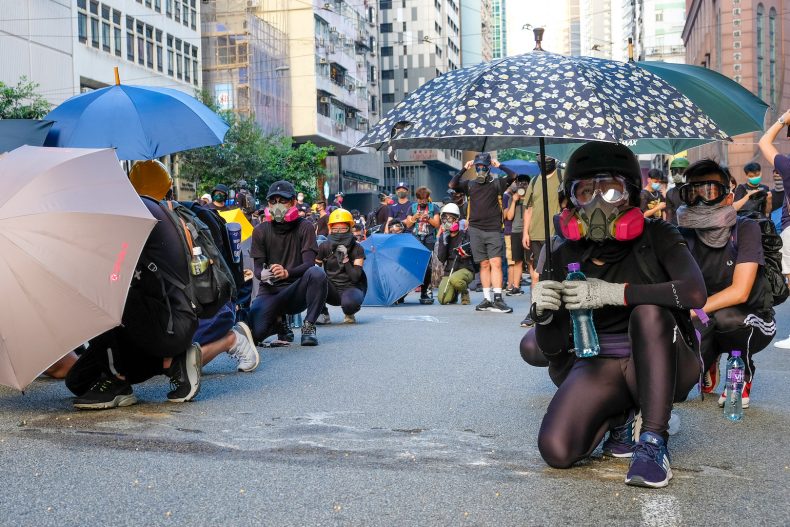
Protesters form an umbrella frontline as cover. Photos by Thomas Brath.
The Diplomat recently sat down for an interview with Emily Lau, a former member of the Hong Kong Legislative Council at the Foreign Correspondents Club in Hong Kong. Lau believes that Beijing doesn’t want to let Lam go yet, for the fear of appearing weak and that there isn’t a suitable replacement which Beijing trusts to take her place. In the meantime, Lam is walking a tightrope serving two masters: She is trying to keep Beijing happy and at the same time trying to win back the trust of the Hong Kong people.
“So this is the mess that we are in right now. What she should have done is to insist to Beijing that meeting the demands of the people are good for Hong Kong,” said Lau.]
The demands of Hong Kongers are already laid out in the Sino-British Joint Declaration and Hong Kong’s Basic Law. This isn’t an issue about independence from the mainland.
One of the important messages that was leaked in the recording of Lam was her telling the group that Beijing will not use the People’s Liberation Army (PLA) to quell the protests. The demonstrations have been chaotic but contained so far and there haven’t been any reports of mass looting or killings and only a few people have been seriously harmed.
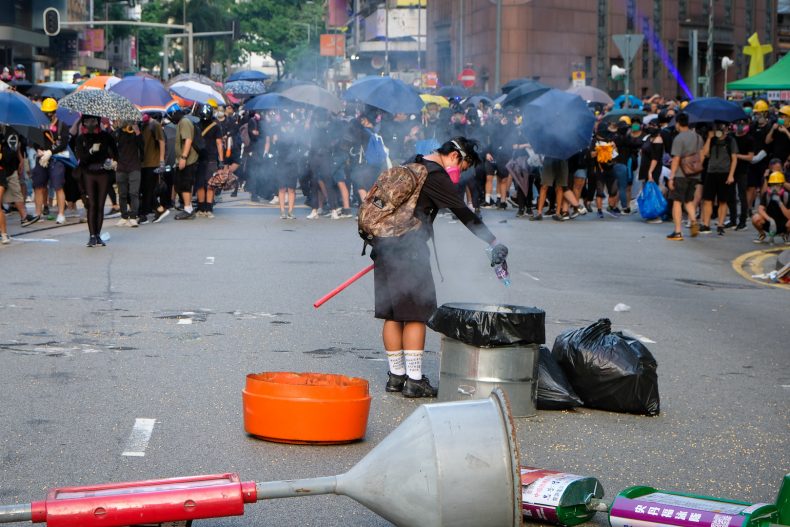
A protester putting out a trash can on fire. Photos by Thomas Brath.
“If things go really very wrong, like in other places, with real riots, burning, looting and killing, of course they will send the PLA out, but I don’t think there is any chance of that happening,” said Lau. The protesters have mainly been targeting the police and the Mass Transit Railway (MTR), which protesters believe have been used as a weapon by the police to inflict brutality away from the media’s cameras.
All eyes will be watching what happens for the upcoming National Day (October 1st) holiday, which is also the 70th anniversary of the founding of the People’s Republic of China. Chinese President Xi Jinping will be planning an extravagant military display in Beijing. Many people are concerned about what might happen if the demonstrations continue in Hong Kong and overshadow Beijing’s parade.
“Carrie Lam also came out and said ‘no, don’t worry that is not a deadline, Beijing can accept it, even if there are demonstrations here in Hong Kong on October 1st, that’s okay.’ So those are the very key messages that both her and Beijing wanted to tell the world,” Lau said.
As a result, some of the concerns that Hong Kongers and the international community had about about another Tiananmen Square massacre have since simmered down.
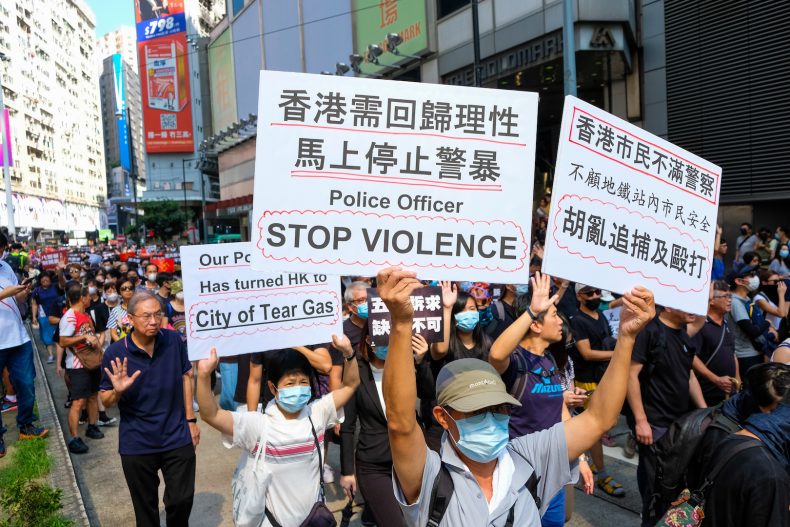
Thousands of protesters fronted up in the streets for the fifteenth consecutive weekend of protests. Photos by Thomas Brath.
The Diplomat spent a few hours with a protester, Dee*, who is an office worker in his forties, at an anti-police brutality assembly at Prince Edward station last weekend. “Hong Kong people are not used to being controlled like this, they are used to being controlled by common interests not a dictatorship,” Dee said. The Diplomat asked Dee about his thoughts on the pro-democracy leadership and the tactics of this latest incarnation of the movement.
“I think they [Joshua Wong and Agnes Chow] are not leading the movement but they are prominent figures due to their past achievements with the Umbrella Movement. The whole movement itself, as far as my knowledge, is all via word of mouth, all via simple ideas that are like planting a tree that later blossoms,” said Dee.
Dee goes on to to argue that the protesters are trying to do what they know best through peaceful and nonviolent means, even if some of the more hardcore protesters feel that these tactics aren’t working. “We have seen these type of movements before in the past 30 years and we are still where we are at today. The more ‘progressive’ protesters will only increase their violence if law enforcement do the same, this is clear,” said Dee.
At a similar protest on Friday night at Admiralty Station, The Diplomat came across a 30-something mainlander, Wang* and asked for his views on the protests. “These protests aren’t all bad, there is still something good to come out of this; the Chinese government will hear the young people’s voice and know what they want, some young people still love China but they don’t know their future and I think eventually Hong Kong will be better in time,” said Wang.
The vast majority of Hong Kong’s youth we encountered at the protests didn’t share Wang’s optimism.
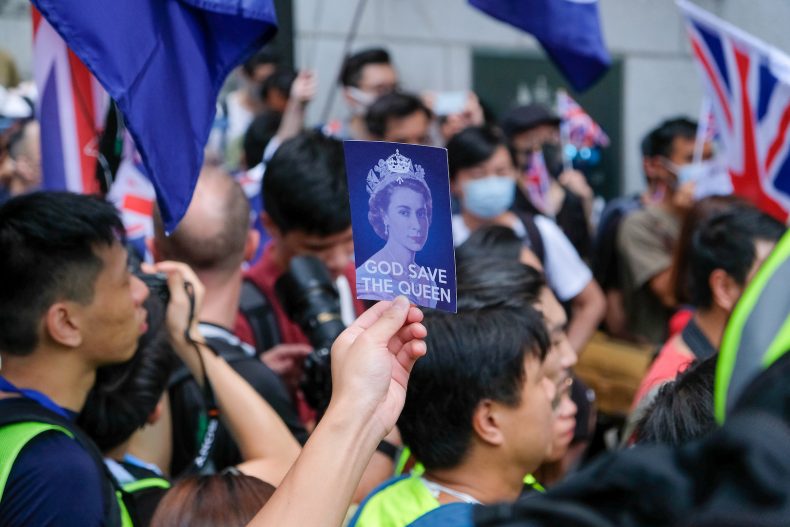
Protesters flying Union Jack flags outside the British Consulate-General building. Photos by Thomas Brath.
Sundays prove to be when some of the larger protests are held in Hong Kong and last Sunday was no different. It started with an, at times, eerily quiet rally interspersed with people somberly singing “God Save the Queen” outside the British Consulate-General in Admiralty. There, protesters petitioned British Consul General Andrew Heyn to appeal to the British government in admitting China’s violation of the Sino-British Joint Declaration. The mood felt more like a funeral than a protest and perhaps it was for many Hong Kongers, who now feel that the declaration is decidedly dead.
As the day unfolded, larger protests swelled in the metropolitan area of Wan Chai and thousands of protesters descended on the Legislative Council (LegCo), other government buildings and the Chinese army barracks. Along the way, some hurled bricks, lit fires, smashed CCTV cameras and spray-painted anti-China slogans on ATM machines, billboards and street signs. In retaliation, riot police fired water cannons laced with blue dye (to mark protesters), rounds of tear gas and rubber bullets.
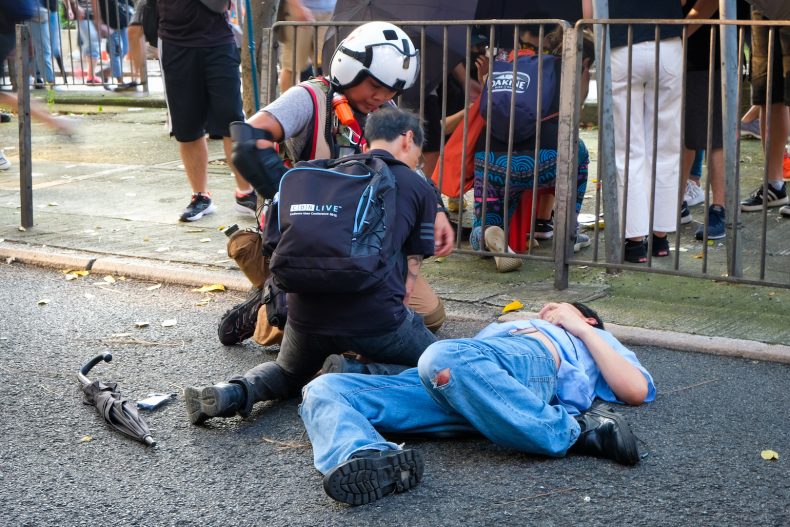
A middle-aged man being treating for injuries during the protests. Photos by Thomas Brath.
In the heat of the exchanges, The Diplomat witnessed one middle aged man assaulted by an angry flash mob and quickly attended to by emergency medics on the scene. The protesters assembled and moved with considerable speed, dressed in black. The support from the many volunteers who pass out water — and even the placid bus and truck drivers simply caught up in the protests — mostly shows an understanding or even commitment to the protesters’ cause.
The international community and Hong Kong’s business community both have influence in how things can play out politically in the future. In the meantime, it seems unlikely that the four outstanding demands from pro-democracy protesters — an independent inquiry into allegations of police brutality, amnesty for arrested protesters, the right of Hong Kongers to elect their own political leaders, and an edict against describing the protests as “riots” — will be met any time soon. As long as those demands remain ignored, Hong Kong can expect more large-scale protests.
*Pseudonyms













